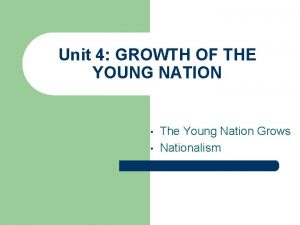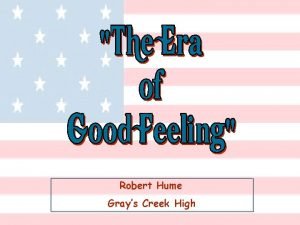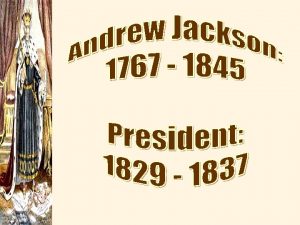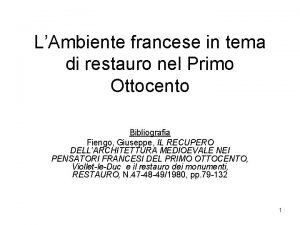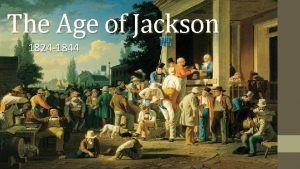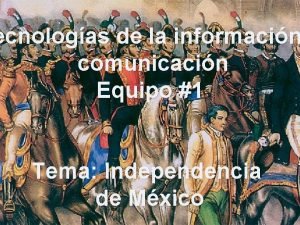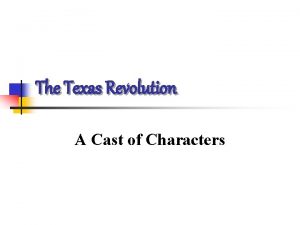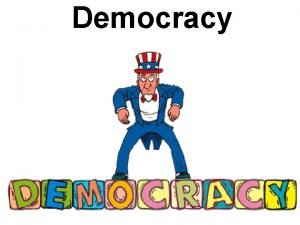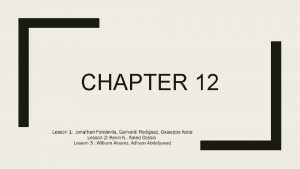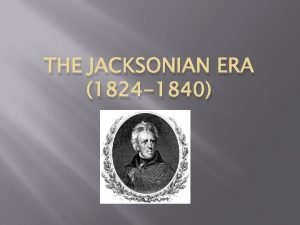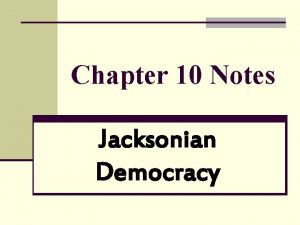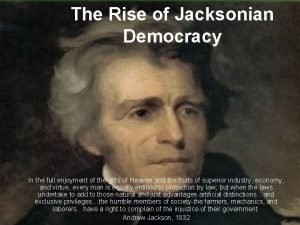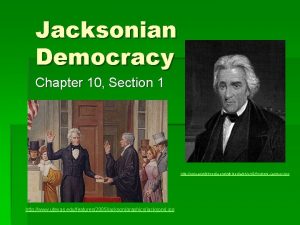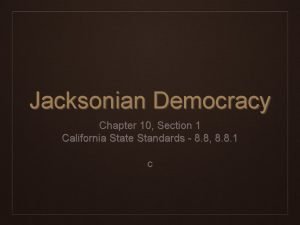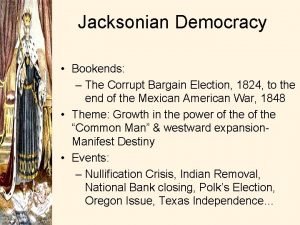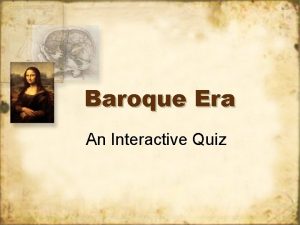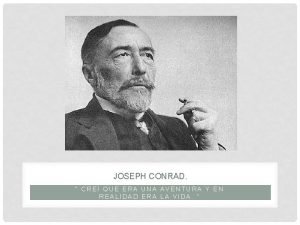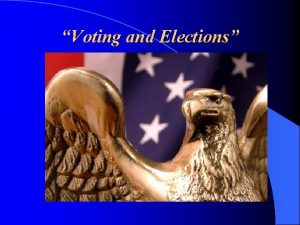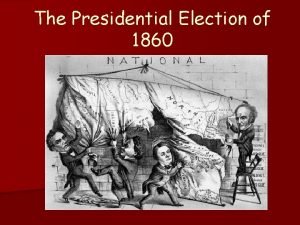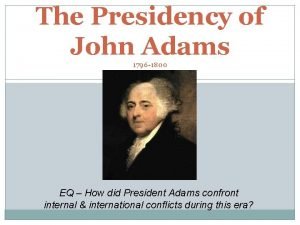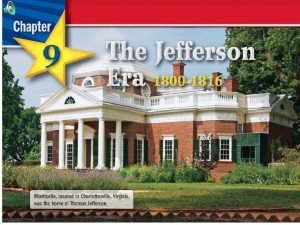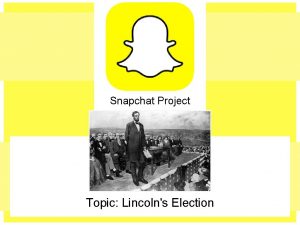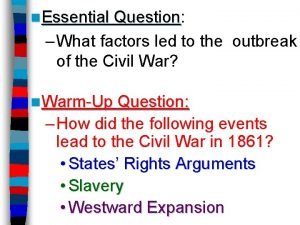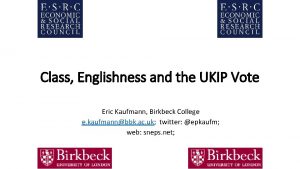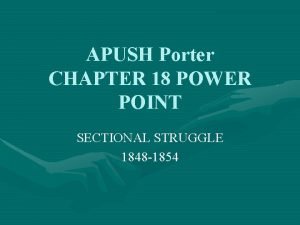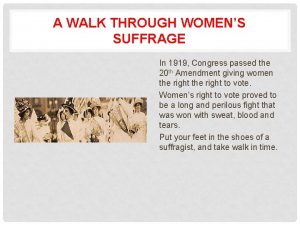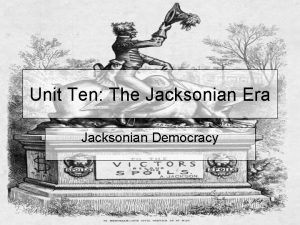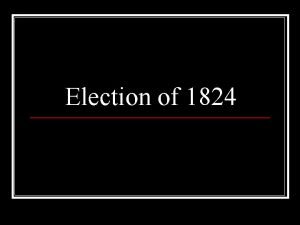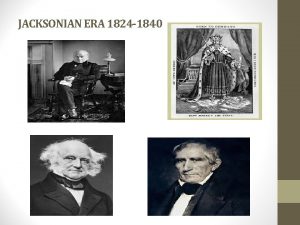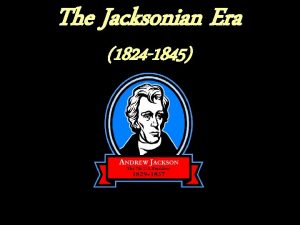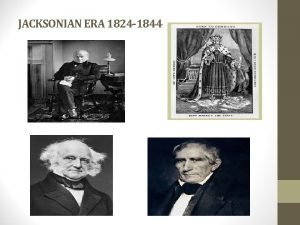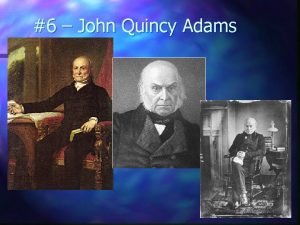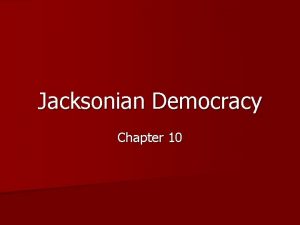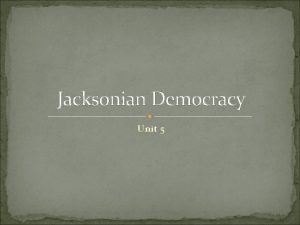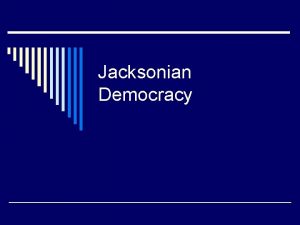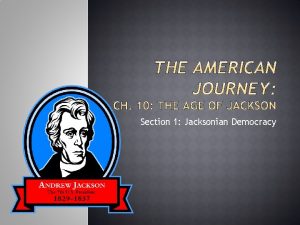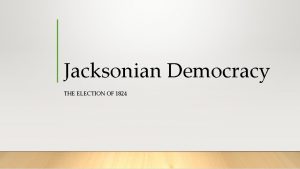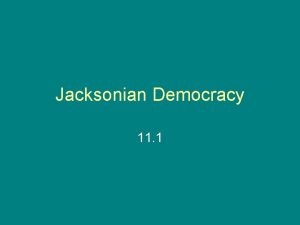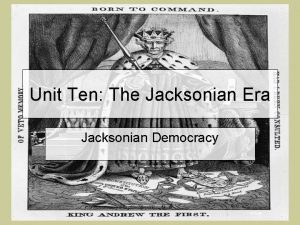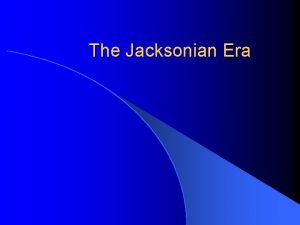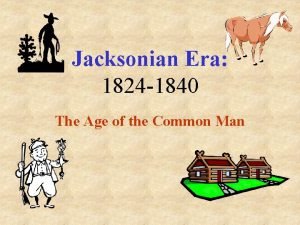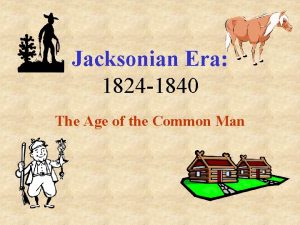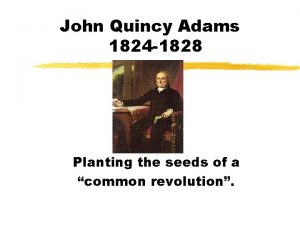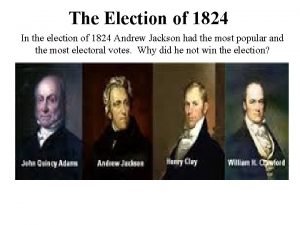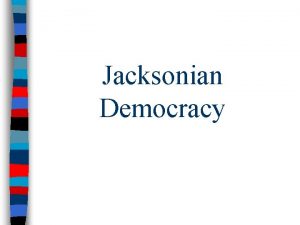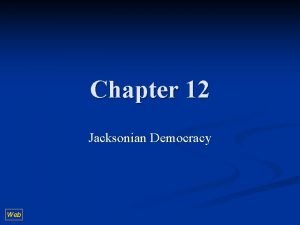The Jacksonian Era Election of 1824 John Quincy































![Even [the] aged…nearly ready to drop in the grave, were traveling with heavy burdens Even [the] aged…nearly ready to drop in the grave, were traveling with heavy burdens](https://slidetodoc.com/presentation_image_h2/85d53e217dcb322d74fe01e8330b36b8/image-32.jpg)











- Slides: 43

The Jacksonian Era

Election of 1824 • John Quincy Adams supported by North • William Crawford supported by South • Andrew Jackson and Henry Clay had supporters in the West. • No one candidate had a majority of electoral votes, so…. . the House of Representatives would decide the winner.

The “Corrupt Bargain ” Andrew Jackson’s supporters publicly claimed that there had been a deal. 1. Henry Clay finished 4 th in voting 2. Henry Clay convinced members of the House to support John Quincy Adams. 3. Adams wins the election. 4. Clay is appointed Secretary of State.

John Quincy Adams Son of John Adams. Planned to build more roads and canals, help education, and regulate use of resources. However, Congress was controlled by supporters of Jackson, and much of his legislation failed.

Election of 1828 • Democrats • Supporters of Jackson • National Republicans • Supporters of Adams Jackson claimed to be the “common man” The idea of majority rule was promoted, and both political parties moved from using a caucus to nominating conventions. This idea of giving political power to ALL white, male citizens is called Jacksonian democracy

“The People’s President” • 1 st President from a western state. (TN) • Parents were frontier farmers from South Carolina • Fought in the American Revolution (at 13) and in the War of 1812 • Judge and land broker; Plantation owner • Nickname: “Old Hickory”

Government Reform • Called the “Spoils system” (“To the victor belongs the spoils [of the enemy]” – Senator William L. Marcy) • Jackson rewarded political party supporters with government jobs. • Defended his appointments by saying that he was breaking another groups control over government.

“Kitchen Cabinet” • Nickname for the unofficial advisors to Andrew Jackson. • Democratic leaders and newspaper editors. • Met in the White House kitchen after hours.

Similarities to Jefferson • Jefferson: • Jackson • Government for the people • Government by the people by well-educated leaders. • Supported farmers and an agricultural society • Supported farmers and laborers in an agricultural and industrial society • Democracy in political life • Democracy in social, political, and economic life. • Limited Government • Limited government, strong executive

States’ Rights

“Tariff of Abominations” • Tariff of 1828 passed by Congress at the end of John Quincy Adams’ term. Cause: Tariff greatly raised taxes on raw materials. Effect: Southerners were angry over the increase in prices for manufactured goods.

Doctrine of nullification. • John C. Calhoun (Vice-President from SC) • The process a state follows to cancel a law that it does not agree with. • Argument for states’ rights.

Webster-Hayne Debate • Debate in the Senate over the idea of nullification between Daniel Webster (NH) and Robert Hayne (SC) • Hayne: “The measures of the federal government…will soon involve the whole South in…ruin” • Webster: “Liberty and Union, now and forever, one and inseparable. ”

The Dinner Party President Jackson was asked to speak at a dinner attended by many supporters of states’ rights. Many were curious what he felt about nullification. • Jackson’s toast: “Our Federal Union…it must be preserved. ” • Calhoun’s toast: “The Union, next to our liberty, most dear; may we all remember that it can only be preserved by respecting the rights of the states and distributing equally the benefits and burdens of the Union ” John C. Calhoun would resign as Vice-President to serve as a Senator from South Carolina.

South Carolina & the nullification crisis 1. South Carolina state legislature nullified the Tariffs of 1828 & 1832 2. Threatened secession if the U. S. government tried to collect tariffs. 3. Henry Clay wrote a compromise tariff in 1833 that temporarily solved this crisis.

The Bank of the United States

2 nd Bank of the United States • Nicholas Biddle – (PA) President of the bank Roles of the bank: • Held all government funds • Loaned money

Jackson and the 2 nd Bank • Distrusted banks • Believed the bank favored the wealthy and did not help the average person. • Believed the bank had too much influence in Congress. • Believed the bank was unconstitutional (even though the Supreme Court had said it was in Mc. Culloch v. Maryland. )

Controversy over the Bank’s charter • The bank could only operate with a charter from Congress. 1. Congress was set to vote again in 1836. 2. Nicholas Biddle requested that Congress renew the charter early in 1832. 3. Congress voted “yes” 4. Andrew Jackson vetoed the charter.

“It is to be regretted that the rich and powerful too often bend the acts of government to their selfish purposes…[B]ut when the laws undertake to…make the richer and the potent more powerful, the humble members of society…have a right to complain of the injustice of their government” --Andrew Jackson


Election of 1832 National Republicans Henry Clay Democrats Andrew Jackson Main issue – Bank of the United States When Jackson was re-elected, he assumed that the public supported him, and his “war” against the Bank of the United States.

“Pet Banks” • Jackson removed the governments money from the Bank of the U. S. and put it in state banks – nicknamed “pet banks” by National Republicans. • Biddle made personal loans more difficult: he believed this would force Jackson to change his mind. It didn’t • The people supported Jackson’s position, and the Bank of the United States went out of business by 1836.

Jackson’s Indian Removal Policy

Points of View • Farmers wanted to use Native American land for cotton crops. • Some wanted Native Americans to assimilate or adapt to American culture. • Some wanted to relocate Native Americans. • Gold had been discovered on some Native American lands, and should be mined.

Five Civilized Tribes • Name given to major tribes in the Southeast. • Had adopted some ways of white civilization. • Held large areas of land in Georgia, North and South Carolina, Alabama, Mississippi, and Tennessee. • Included the Cherokee, Chickasaw, Choctaw, Creek, and Seminole.

The Cherokee Nation • Recognized by the federal government in the 1790’s. • Sequoya had invented an 86 character alphabet. • Many were farmers and cattlemen. • The Cherokee Phoenix was published. • 1827 – A Constitution for the Cherokee was written founding their own nation.

Jackson’s Point of View • Native American’s were a conquered people, and had to follow the laws of the United States. • There could not be a separate nation within the borders of the United States. 1. Adopt American culture Or 2. Move outside of American borders.

Indian Removal Act of 1830 Native Americans would pay for their land or be moved west of the Mississippi River. • Indian Territory (present day Oklahoma) is established in 1834.

Worcester v. Georgia • Supreme Court decision: The state of Georgia does not have the power to claim Cherokee lands. Native Americans are protected by the Constitution. Andrew Jackson: “John Marshall has made his decision…Now let him enforce it. ”

Trail of Tears - 1838 • Forced removal of 17, 000 Cherokee from Georgia to the Indian Territory. • General Winfield Scott and 7, 000 federal troops supervised the move.
![Even the agednearly ready to drop in the grave were traveling with heavy burdens Even [the] aged…nearly ready to drop in the grave, were traveling with heavy burdens](https://slidetodoc.com/presentation_image_h2/85d53e217dcb322d74fe01e8330b36b8/image-32.jpg)
Even [the] aged…nearly ready to drop in the grave, were traveling with heavy burdens attached to their backs, sometimes on frozen ground and sometimes on muddy streets, with no covering for their feet. --An eyewitness to the Trail of Tears in Kentucky.

Osceola and the Seminoles • Seminole leader who fought the U. S. Army. • Refused to leave Florida for the Indian territory. • Died after being captured in 1834. • The Seminole were defeated and removed after a third series of battles in 1858.


At the end of Jackson’s 2 nd Term… • Great deal of growth and prosperity. 1. “Pet Banks” make many loans – without the bank of the U. S. , there were no limits. 2. Speculators begin to buy up large amounts of land. 3. Banks print more paper money to keep up with the demands for loans. • Inflation: When prices and the value of the money.

Martin Van Buren • Elected 8 th President. • New York • Elected with help from Jackson’s popularity and support. • Believed in laissez-faire, that government should interfere with the economy as little as possible.

Panic of 1837 • Failure of banks and the loss of hundreds of thousands of jobs. • Worst economic depression in the U. S. up to this point in history. • Even worse than the end of the American Revolution! • Result of: – Too many loans – Too much paper money – Closing of the Bank of the U. S. President Van Buren receives much of the blame. Did he deserve to…?

Whig Party • Formed by Henry Clay, Daniel Webster, and other opponents of Andrew Jackson. Named after a British party that opposed royal power. • Opposed a strong executive branch. • Believed the government should help with the economy. • Supporters: New England businessman, planters, and former Federalists.

Election of 1840 Democrats Martin Van Buren Whig Party William Henry Harrison • More about personalities than issues • “Log Cabin” campaign:

William Henry Harrison • Western governor and war hero. • “Tippecanoe and Tyler Too!” • 1 st President to die in office.

John Tyler • Former Democrat • Surprised Whig party by going against some of their policies after his inauguration. --Vetoed a charter for a new Bank of the U. S. • Tyler’s cabinet resigned in protest & he was removed from the Whig Party

Election of 1844 • Whig Party continues to split along sectionalist lines. • Democrats are able to campaign successfully on the political platform of western expansion. -- Annex Texas. --Take over Oregon • James K. Polk is elected.

James K. Polk • Democrat • Wanted to expand the U. S. westward. • Former TN governor & member of Congress. • “Dark Horse” candidate
 Monroe doctrine cartoon meaning
Monroe doctrine cartoon meaning Election of 1824
Election of 1824 Election of 1824
Election of 1824 Adams and adams secretarial training
Adams and adams secretarial training Centergize
Centergize Sterile gloves
Sterile gloves Anna baldwin milking machine
Anna baldwin milking machine Quatremere de quincy restauro
Quatremere de quincy restauro In quincy
In quincy Romantic period 1798 to 1832
Romantic period 1798 to 1832 What are the components of accenture delivery suite
What are the components of accenture delivery suite The age of jackson 1824-1844
The age of jackson 1824-1844 Constituição 1824
Constituição 1824 The romantic age (1798 to 1824)
The romantic age (1798 to 1824) Avolida
Avolida Juan seguin famous quotes
Juan seguin famous quotes The age of jackson 1824-1844
The age of jackson 1824-1844 Austin
Austin Democracy definition by aristotle
Democracy definition by aristotle Chapter 12 lesson 1 jacksonian democracy
Chapter 12 lesson 1 jacksonian democracy The jacksonian austin
The jacksonian austin What is jacksonian democracy? *
What is jacksonian democracy? * Jacksonian democracy
Jacksonian democracy Jacksonian democracy
Jacksonian democracy Chapter 10 section 1 jacksonian democracy
Chapter 10 section 1 jacksonian democracy Chapter 10 section 1 jacksonian democracy
Chapter 10 section 1 jacksonian democracy Corrupt bargain political cartoon
Corrupt bargain political cartoon Era quiz: the baroque era
Era quiz: the baroque era Elizabethan and victorian era
Elizabethan and victorian era Creí que era una aventura y en realidad era la vida
Creí que era una aventura y en realidad era la vida Poema sobre as estrelas
Poema sobre as estrelas John dewey progressive era
John dewey progressive era Cobra election form sample
Cobra election form sample Brainpop political parties
Brainpop political parties Definition
Definition What problems did this election underscore adams
What problems did this election underscore adams The election of 1800 showed that
The election of 1800 showed that Lincolns election date
Lincolns election date Abraham lincoln's election
Abraham lincoln's election Lincolns election
Lincolns election British election study
British election study Election of 1852 apush
Election of 1852 apush Election day political cartoon
Election day political cartoon 1796 election
1796 election
